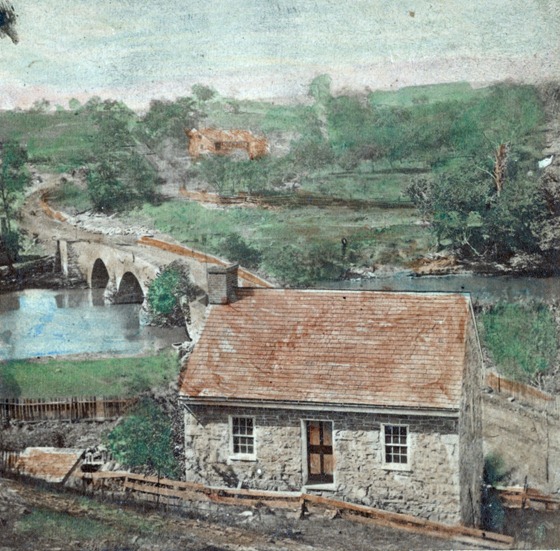September 24th.
Yesterday the General saluted us with “Young ladies, if you will ride in a Confederate carriage, you may go to dress parade this evening.” Now, in present phraseology, “Confederate” means anything that is rough, unfinished, unfashionable, or poor. You hear of Confederate dresses, which means last year’s. Confederate bridle means a rope halter. Confederate silver, a tin cup or spoon. Confederate flour is corn meal, etc. In this case the Confederate carriage is a Jersey wagon with four seats, a top of hickory slats covered with leather, and the whole drawn by mules. We accepted gladly, partly for the ride and sight, partly to show we were not ashamed of a very comfortable conveyance; so with Mrs. Badger as chaperon, we went off in grand style. I must say I felt rather abashed and wished myself at home as we drove into town, and had the gaze of a whole regiment riveted on us. But soon the men fell in line, and I did not feel so painfully conspicuous. I was amused at a contrast near by, too. There was but one carriage present, besides ours, though there were half a dozen ladies on horseback. This carriage was a very fine one, and in it sat three of the ugliest, dowdiest, worst dressed females I ever saw. We three girls sat in our rough carriage as comfortable as could be, dressed — well, we could not have been dressed better and looking our very best. Sans mentir, I think the Confederates were much the most respectable.
And what a sad sight the Fourth Louisiana was, that was then parading! Men that had fought at Shiloh and Baton Rouge were barefooted. Rags was their only uniform, for very few possessed a complete suit, and those few wore all varieties of colors and cuts. Hats could be seen of every style and shape, from the first ever invented down to the last one purchased evidently some time since. Yet he who had no shoes looked as happy as he who had, and he who had a cap had something to toss up, that’s all.
Four or five that we knew gathered around our vehicle and talked to us. Mr. Heuston told me he heard I had been thrown, severely injured, had a narrow escape, etc. Was not thrown! Saddle turned. A few steps off we recognized Mr. Scales. He would stare very hard at us, and if we turned towards him, would look quickly the other way as though afraid to meet our gaze. Presently he gave us an opportunity, and we bowed. He came forward eagerly, blushing deeply, and looking very much pleased, and shook hands with us, and remained some time talking. He said he had not heard of our arrival, but would call as soon as possible. Mr. Talbot had joined Breckinridge.
Having seen the last of that parade, he invited us to see that of his sailors, which was next; but it was too far; so we turned off to see Colonel Breaux’s, a mile away. His, the Thirtieth Louisiana, is a beautiful encampment on a large open common. Parade was almost over as we reached there, and soon the Colonel came to meet us. I did not look at the drill. I was watching the hundreds of tents — it looked like a great many — and was wondering how men could live in such places, and was trying to fancy what George’s or Gibbes’s looked like. It was pleasant to watch the barefoot soldiers race around like boys let loose from school, tossing caps and chips at two old gray geese that flew in circles around the encampment, just as though they had never had more earnest work. One gray-headed man stood in the door of his tent, while a black-headed young one danced before him, to his own whistle, with his arms akimbo. Altogether it was a very pretty picture; but poor men! how can they be happy in these tents?












